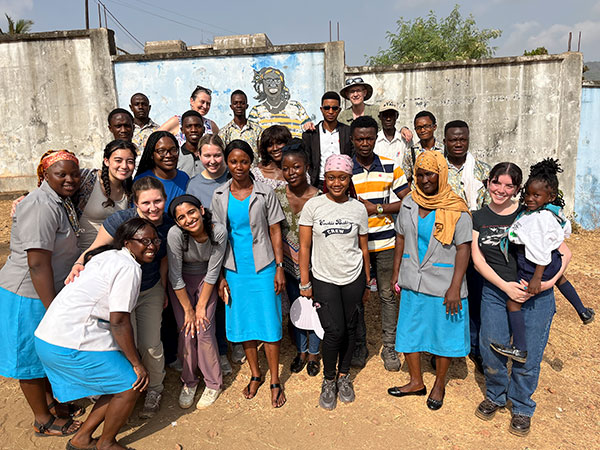Journalism students travel to Sierra Leone to film documentary about period poverty
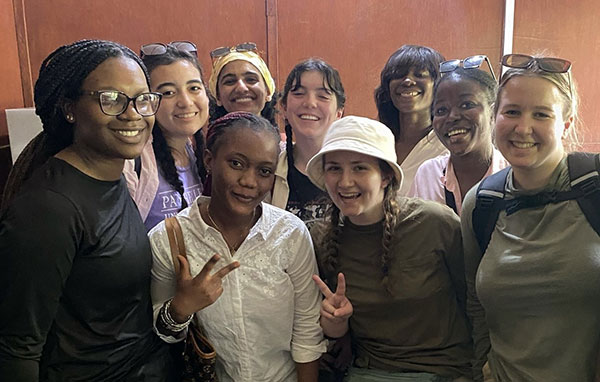
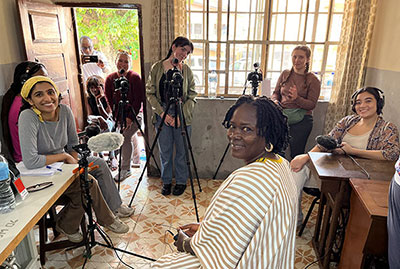 A group of journalism students heard harrowing stories from the local women they interviewed while filming a documentary about period poverty in Sierra Leone, West Africa, over spring break.
A group of journalism students heard harrowing stories from the local women they interviewed while filming a documentary about period poverty in Sierra Leone, West Africa, over spring break.
“Girls talked of being bullied at school when they got their period. Mothers talked about the struggle to have enough money to feed their children,” said Alison Davis, a lecturer in journalism who co-led the trip with Charles “Stretch” Ledford, associate professor of journalism.
While difficult to hear, students hope sharing these stories will shed light on a widespread global issue known as period poverty, which refers to a substantial negative impact on one’s quality of life due to shame, economic destitution, and/or religious and cultural taboos associated with menstruation.
"All women have periods, but not all women have access to period products,” said Elena Cleary, a junior in agricultural communications. “It is my privilege to be able to share the stories of the most amazing, resilient, and kind-hearted women I have ever met."
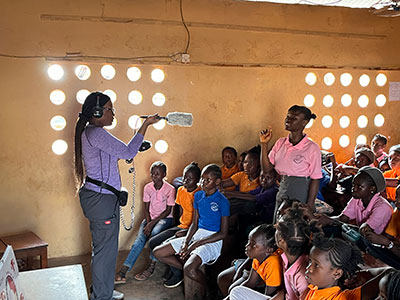 The forthcoming documentary, From Shame to Celebration: Sierra Leonean Women Reframe the Culture of Menstruation, focuses on a local woman-led grassroots organization called Uman Tok, which employs 18 women at a living wage to provide sustainable feminine health kits to women and girls around the country. In addition to making tangible progress to alleviate period poverty and menstrual exclusion, Uman Tok is educating a generation of girls and boys on sexual and reproductive health awareness.
The forthcoming documentary, From Shame to Celebration: Sierra Leonean Women Reframe the Culture of Menstruation, focuses on a local woman-led grassroots organization called Uman Tok, which employs 18 women at a living wage to provide sustainable feminine health kits to women and girls around the country. In addition to making tangible progress to alleviate period poverty and menstrual exclusion, Uman Tok is educating a generation of girls and boys on sexual and reproductive health awareness.
The film will feature interviews with a nurse midwife, the headmistress of a small semi-private school just outside of Freetown, and girls at the school who speak about the challenges they face as young women.
The reporting trip is part of a new pilot class in the Department of Journalism, led by Davis and Ledford. They hope the class, “Globally Focused Advanced Documentary Filmmaking,” will be offered by the journalism department each spring semester.
The spring 2024 pilot class was executed in collaboration with Dr. Sophie King-Hill of the University of Birmingham (UK) and Dr. Francis Sowa of Fourah Bay College in Freetown, Sierra Leone.
Ledford originally conceptualized the class as a research and learning lab where advanced journalism students would develop and apply their skills as documentary filmmakers and multimedia backpack journalists to report on issues of pressing international concern, especially in the Global South. Davis, who has over 25 years of experience producing nationally distributed documentaries, is mentoring the students in the process of creating their first long-form video story.
Illinois students partnered with four honors broadcast journalism students from Fourah Bay College to shoot primary footage for the film.
Ledford said he hoped the experience would be as beneficial for the Sierra Leonean students as it was for those from Illinois.
Fourah Bay student Hannah Yankson described her experience as amazing as well as enlightening.
“As a media practitioner, I have been reporting on issues in the country, but this experience is one I will never forget,” Yankson said. “We got the chance to know about their classes at [the University of Illinois] and how journalism is practiced on their side, and they also learned from our side as to how our university operates.”
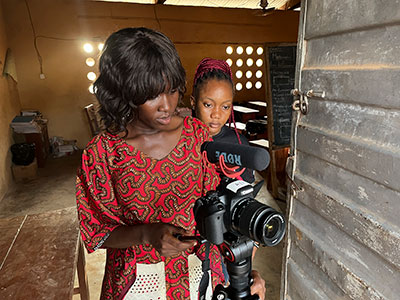 Stella Bangura, also a Fourah Bay student, said learning how to use the equipment was somewhat difficult, but the Illinois team was helpful.
Stella Bangura, also a Fourah Bay student, said learning how to use the equipment was somewhat difficult, but the Illinois team was helpful.
“This was really an important exposure and experience for us,” she said. “It was highly meaningful as we enriched ourselves with [new] ideas and different knowledge.”
Illinois students left for Sierra Leone on March 6 and returned March 16. For five days they worked on production of the film, conducting interviews, and shooting B-roll in Freetown and nearby Allen Town. They also took a day to tour Bunce Island, a major transit point for West Africans who had been imprisoned and were destined for slavery in the Americas.
Ledford, who has worked in nearly 60 countries in the last 40 years, said traveling to a developing country can present numerous issues and this experience was no different.
“The challenges were myriad and nearly unceasing. Everything from powering our equipment to finding quiet places to interview our subjects in a crowded, cacophonous city; from dealing with lack of Internet connectivity to keeping our team fed and hydrated over many hours in the field; not to mention the abundance of various fauna unfamiliar to our students,” he said.
While the work was stressful and exhausting, with students and instructors working up to 20 hours a day, Ledford said it was also rewarding and infused with laughter and tears of both joy and utter sadness.
“Time will tell the true impact the assignment had on them,” Ledford said.
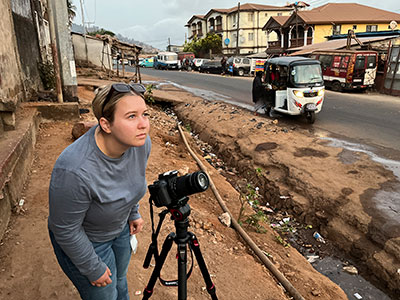 Maggie Knutte, a junior in journalism, said the experience left a lasting impression on her.
Maggie Knutte, a junior in journalism, said the experience left a lasting impression on her.
“The subjects we were interviewing and working with were some of the most amazing women I have ever had the privilege of meeting,” Knutte said. “Now after coming home, I feel so honored that I am able to help tell their stories to the world. They are some of the kindest people I have ever met, despite living with hardships I could not imagine.”
For Faith Lee, a junior in journalism, the trip was the most fulfilling week of her life.
“Being a part of this project has not only made me a better storyteller and journalist, but a better human being,” Lee said. “I hope our work will show that period poverty is not just a Sierra Leonean issue, but a global issue.”
Davis said the week abroad was one of the most rewarding weeks of her teaching career and praised the work ethic and talent of the Illinois and Fourah Bay students who had to put their classroom knowledge to the test, making quick decisions under pressure, working in an uncontrolled environment, and dealing with the physical challenges of 90+ degree heat with no air conditioning.
She said the students also had to get comfortable asking extremely hard questions and then processing the sometimes-difficult information they gathered.
“These women shared their stories because of the foundation of trust our students built with them. This is probably what I am most proud of—that our students, including those from Fourah Bay College, conducted these hard interviews with grace,” Davis said.
Davis and Ledford intend to build on their relationship with Fourah Bay College faculty and students and continue to tell the story of Sierra Leonians working locally to mitigate the impact of the global problem of period poverty, and of other woman-led solutions to issues as framed by the United Nations Sustainable Development Goals.
A chapter of the documentary, From Shame to Celebration: Sierra Leonian Women Reframe the Culture of Menstruation, will premiere on the web on May 28, 2024, which is recognized worldwide as Menstrual Hygiene Day. Their goal is for the full feature to be seen locally and nationally on PBS member stations, the BBC, and broadcast in Sierra Leone.
The project is funded by:
- The University of Illinois Office of the Vice Provost of International Affairs BRIDGE Grant
- The University of Illinois Vision 2030 Global Strategy Implementation Grant
- The University of Illinois Department of Journalism
See more photos from the class's visit to Sierra Leone.
—Story by Kelly Youngblood; photos by Charles “Stretch” Ledford
